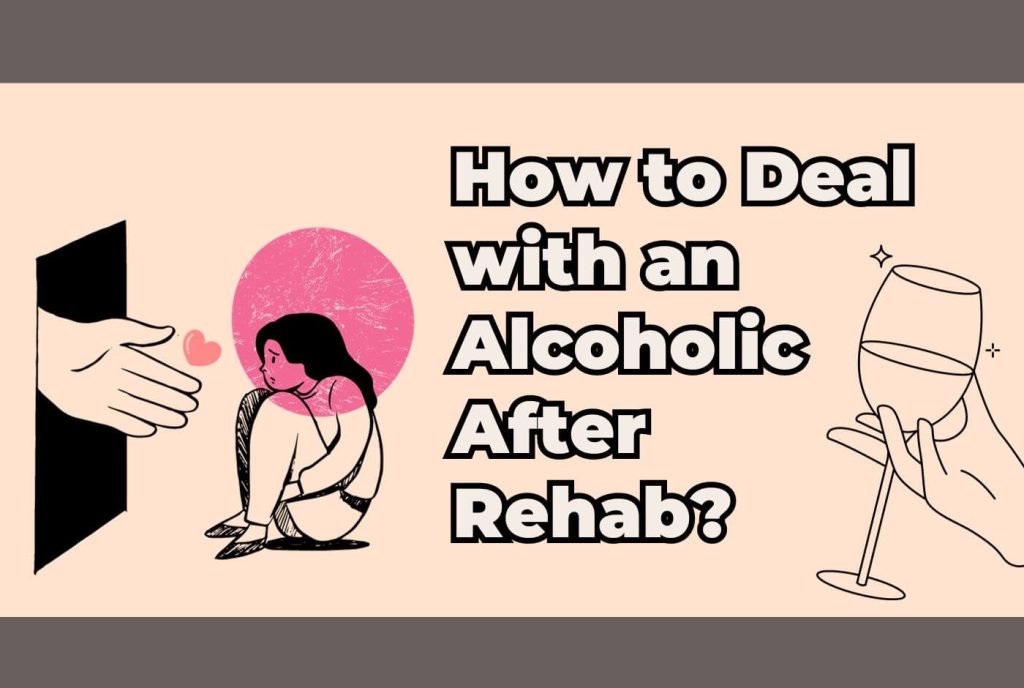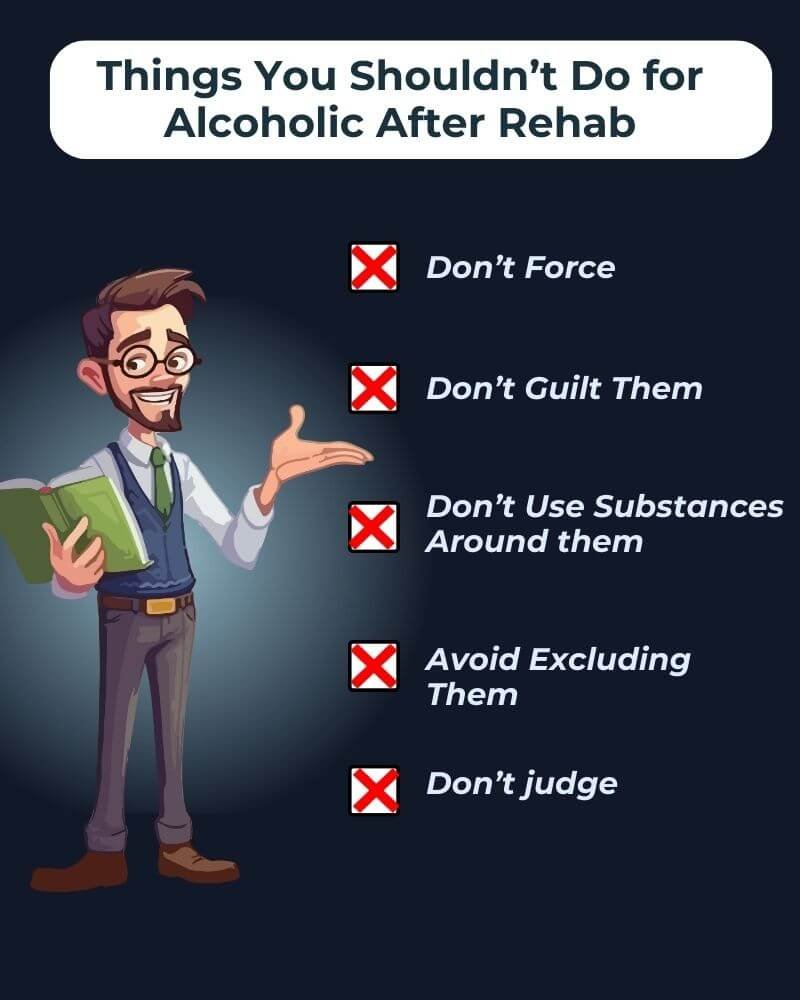Navigating life with a loved one who has battled alcoholism can be a challenging journey, even when they have finished rehab. According to NIAAA, only one-third of the addicts (35.9%) are successful at staying sober after completing rehab. So, most of them just relapse.
When an alcoholic returns home from rehab, yet, the path to recovery doesn’t end. It’s a continuous expedition that demands unwavering support and understanding. Can an alcoholic be forced to stay sober? The answer is no. Recovery is a personal journey, and the decision to stay sober ultimately lies with the individual. However, friends and family can play a vital role in providing a supportive environment that encourages positive choices and healthy habits. Encouraging open communication and addressing underlying issues can help the alcoholic stay on the path to recovery. If an alcoholic does experience a setback and relapses after rehab, it’s important for loved ones to remain supportive and understanding. Instead of placing blame, it’s crucial to focus on the next steps after failed rehab and how to move forward in a positive direction. This may involve seeking additional professional help, reassessing treatment options, and providing continued emotional support to help the individual get back on track with their recovery journey.

When my father returned home after two years of inpatient rehab, he was emotionally very overwhelmed. My family almost felt like starting anew, felt complete after a long time. So, you must welcome them home and cherish their feeling that they have finally won something in life.
In this blog, we’ll explore the dos and don’ts when your loved one has come from rehab and how you can deal with them emotionally. Just like a delicate plant needs nourishment, the home-coming person may need ongoing care to prevent the weeds of relapse from taking root in them. Let’s jump to the blog!
Things You Should Do for Alcoholics After Rehab
Post-rehab situations require a thoughtful approach. The mental situation of the rehab returned person might not cope up with others. Then comes your role when you have to deal with them thoughtfully so they might not get hurt or feel helpless.
Here are some things you should do for alcoholics after rehab-
Educate Yourself
Speaking from personal experience, I can say that knowing the complexities of alcoholism makes compassionate support easier. Find information about triggers, therapy, and addiction. Information becomes a strong friend in this ongoing conflict.
Encourage New Interests
Get the person involved in things that make them feel passionate. After going to rehab, my friend found comfort in painting, which gave her a good way to deal with feelings that used to fuel her addiction.
Support Ongoing Treatment
Attending therapy sessions together fosters a sense of unity. Provide support, reinforcing the importance of continued professional guidance on the path to recovery.
Learn About Recovery
Learn about the different steps of recovery. Seeing the growth firsthand, from recognising to maintaining, gives you and your loved one strength.
Create a Sober Environment
Make your shared areas safe places to stay sober. Getting rid of triggers and encouraging happiness at home helped my cousin a lot with staying stable after rehab.
Create Boundaries
Setting explicit boundaries supports a good relationship. If everyone knows what is expected of them, they won’t fall into the traps that could lead them back to old habits.
Give Healthy Choices
Encourage people to eat well, exercise, and get enough sleep. The fact that my dad was committed to wellness after rehab showed me how much living choices affect staying sober.
Show You Care
Simple gestures matter. My family’s unwavering support conveyed the love that fueled my father’s recovery, whether through a heartfelt conversation or a small gesture.
Avoid unnecessary arguments
Emphasize how important it is to be patient and understanding. Talk about how you’ve handled conflicts in the past using empathy and tact, and stress how pointless fights are during the delicate time after rehab.
Things You Shouldn’t Do for Alcoholic After Rehab

Supporting your loved one post-rehab involves knowing what to avoid. Here are crucial actions to steer clear of:
Don’t Force
Respect their pace. Forcing decisions or pushing them into uncomfortable situations can trigger a relapse. Emphasize the importance of allowing autonomy in the recovery process.
Don’t Guilt Them
Guilt is counterproductive. Instead, offer understanding and empathy. My father’s experience taught me that guilt only hinders progress, while a compassionate approach fosters a healthier mindset.
Don’t Use Substances Around them
Maintain a sober environment. My neighbor’s relapse was influenced by the presence of substances, highlighting the need for a supportive, substance-free space.
Avoid Excluding Them
Isolation leads to vulnerability. My cousin thrived in an inclusive environment post-rehab, emphasizing the importance of avoiding exclusion during the recovery journey.
Don’t judge
Shame grows from judgment. Recognize that healing is a complicated process and try to understand. My coworker’s recovery journey showed me how important help that doesn’t judge can be for staying sober.
How to Deal with Relapses After Detox?
Coping with relapses after detox is a delicate and complex process that demands understanding, resilience, and a commitment to continuous support. Despite the efforts invested in detox, relapses can occur due to various triggers.
In my neighbor’s recovery journey, she found that relapse actually became a stepping stone for renewed determination. It’s important to remember that setbacks don’t undo all the progress you’ve made. Did you know that around 40-60% of people in recovery may experience relapse? It just goes to show how important it is to respond with compassion.
Creating an environment of open communication is vital. My neighbor stressed the importance of discussing triggers and seeking professional guidance promptly.
It’s a process of learning, changing, and reaffirming your decision to stay sober for a long time. Addicts and the people who help them can handle relapses with strength and drive if they understand how complicated addiction is and take action.
People Also Asked
What to Do if Your Loved One Doesn’t Want Help?
If a person you care about doesn’t want to get help, show them you understand and are concerned. First, voice your worries without passing judgment, and then listen to their point of view. Tell them about the good things and help them without pushing, and think about getting a professional interventionist to help you have a talk. Increasing knowledge over time can sometimes make someone want to get help.
How Do I Convince Someone To Go Back To Rehab?
Talk to them honestly about what you’ve seen them going through and stress how much you care about their well-being. Talk about the good things that happened during their last rehab stay and the progress they made. Draw attention to the chance for continued healing and growth with more care.
It is not that difficult to maintain the required things to show some love and support to your close one who is addicted. In some cases, after-rehab precautions are considered more impactful than even rehab itself.
Carelessness during this time can lead to relapse, in worst cases, back to addiction. So be there for your loved one and help them grow during their journey! Know if you can support rehab people through volunteering.
- What to Pack for 30-Day Rehab? FREE Checklist - May 30, 2024
- Types of Outpatient Rehab: Difference One Should Know - March 28, 2024
- Truth Behind FMLA: Hidden Hurdles of Alcohol Rehab Leave - March 28, 2024